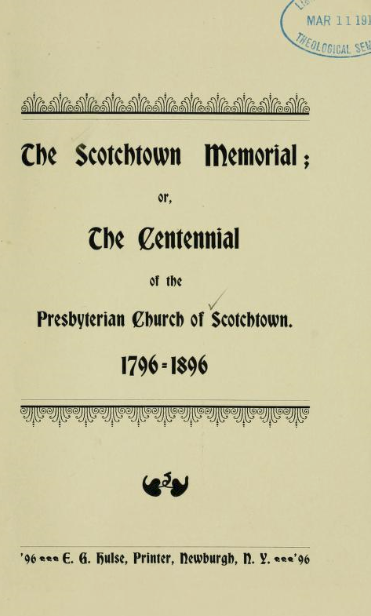
ABOUT SCOTCHTOWN PRESBYTERIAN
Scotchtown Presbyterian Church was assembled in 1797, and incorporated in 1801. Our church is the “light on the hill.” Our mission, to lead people to Christ, and our service to the community, is central to our identity. Throughout our history, we’ve reached out to those within the New York community and within our church to promote a deep and abiding faith in Christ.
Our Denomination…
The Presbyterian Church (USA) is one of several church denominations all identifying as Presbyterian—it is the largest with about 1.5 million members—but with a range of nuances in their theological understanding and mission priorities. It is a rich time in Presbyterian history, as within the last 40 years there has been much spirited debate over which of these nuances is the most faithful to Scripture and Christian tradition. As a result, several new Presbyterian denominations have been established in recent decades as Presbyterian believers have tried to work out their differences in approaching Biblical interpretation and theological convictions. Interestingly, the PC (USA) is one of the few of these denominations formed by two different denominations seeking union and reconciliation, which occurred in 1983. The PC (USA) could be understood as seeking faithfully to be a “big tent” church. That is to say, our denomination understands that it is natural for Christian believers to have differing views on matters of faith, and rather than split over our differences, we should make room for a range of beliefs, and congregations that embody that range.


Why Presbyterian?
At the heart of it, the root word “presbyter” says it all. This is the word, in the original Greek of the New Testament, presbyteros translated as “elder.” Based on our reading of the New Testament, Presbyterian churches understand that elders—both lay elders and ministers—should be responsible for carrying out the ministry and mission of the church in a democratic fashion, rather than under the authority of a hierarchical priesthood. This was a widespread theological insight that re-emerged in the Protestant Reformation that unfolded from the 15th through the 17th centuries, from which Presbyterianism arose.
Our denomination’s constitution is comprised of a Book of Confessions and a Book of Order. That constitution lays out the overarching boundaries of what we believe and how we function as a church, understanding that within those boundaries, congregations and individuals will differ in how they carry out those beliefs and functions. Congregations within a certain region comprise a Presbytery, and their members understand themselves to be “connected” with and accountable to the other churches in that Presbytery. In turn, Presbyteries within a certain region are interconnected and comprise a Synod. The entire structure is governed by a General Assembly that convenes every 2 years to decide matters of theology, worldwide mission, and governance and is maintained by our denomination, the Presbyterian Church in the United States of America. (PCUSA).
